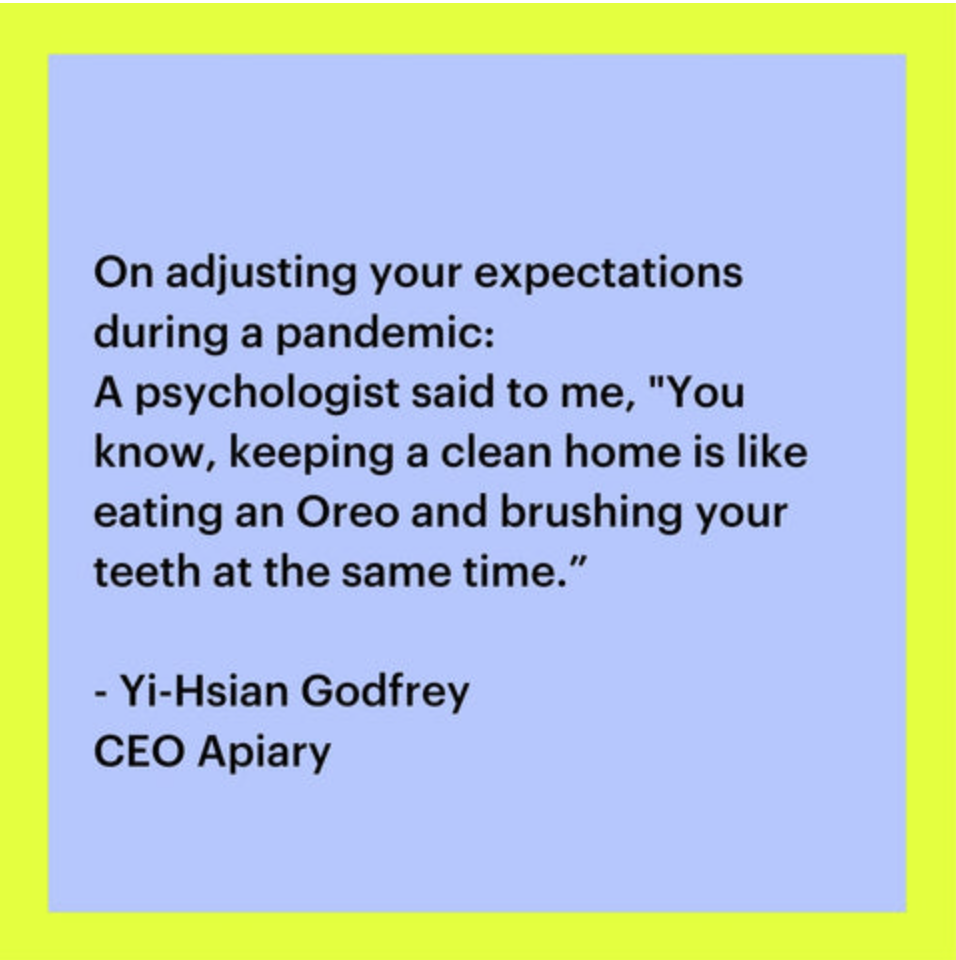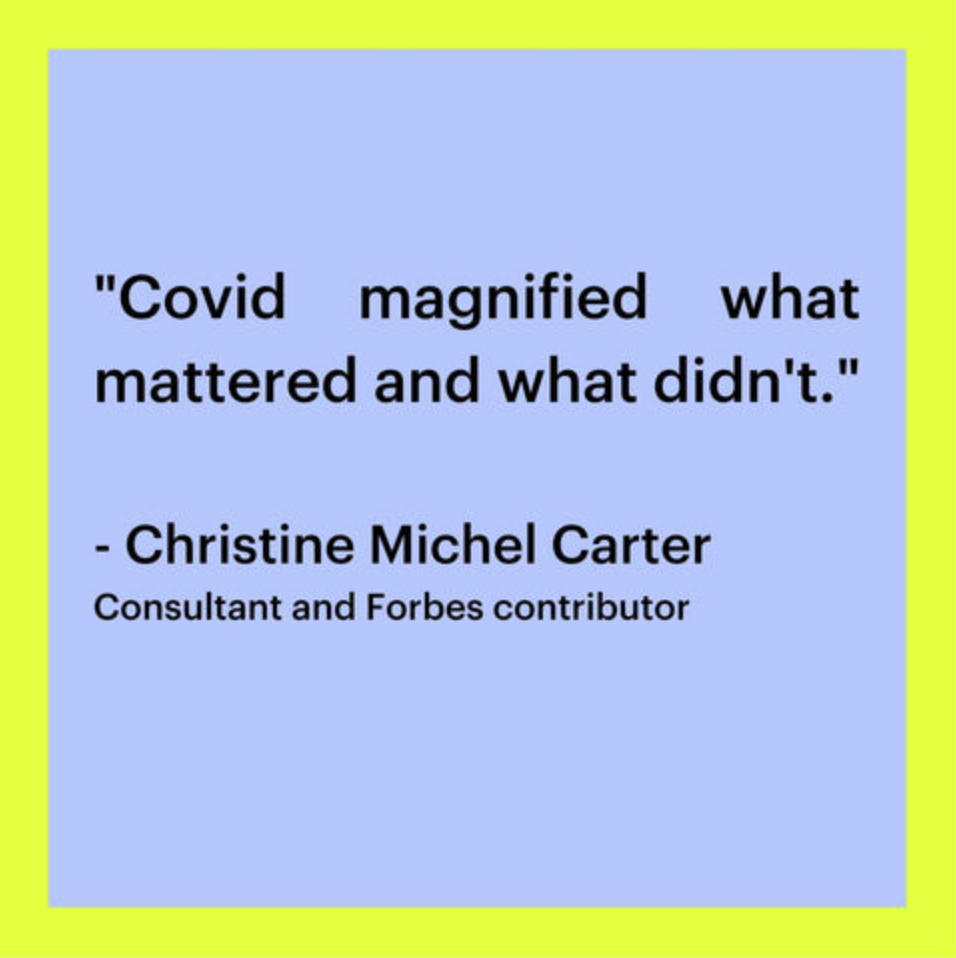What The Pandemic Taught Us About The Juggle: Work, Life & Family
We're calling it a "health and wellness check-in"— discussing what we’ve learned since the pandemic began and how we’re moving forward with these learnings and shifted expectations.
Despite the challenges this pandemic has thrown at working parents at EVERY TURN since March 2020 (and well into 2021...), there have been some important AH-HA moments. While there were certain parts of our lives we missed (hello travel, going out to dinner with friends, childcare, seeing family, hugs, etc), there also seems to be things we might not actually need in life. What’s clear is we have each experienced a lot. That’s why it’s important to take a moment to reflect on these experiences and to acknowledge the changes. What are those things we are taking with us going forward and what do we leave behind?
We had three badass leaders, moms and women from coast-to-coast join us with the impressive moderator, Amy Shoenthal, a Forbes contributor. Panelists include: Alison Hotchkiss (Owner, Alison Events, author, mom to 6 ½ year old daughter), Christine Michel Carter (Forbes Women contributor, Consultant and single mom to 6 ½ & 10 year old kids), Yi-Hsian (pronounced "E-Schwan") Godfrey is CEO & co-founder of Apiari, caregiver for elderly parents and mom to 10 & 13 year old kids.
Needless to say, it was an awesome and inspiring conversation. It's honest, relatable AF and you'll probably nod your head or cry in agreement. It's been a rough 18+ months. Watch/Listen to it here or read on below!
Here are our biggest takeaways from the talk.
The pandemic has forced us reset our boundaries
AH: The pandemic forced me to reset boundaries with my clients, my child and even myself. My industry is demanding and whether I needed to lean on my team more because it was before 9am and I was with my daughter or setting boundaries for myself, like getting up to get fresh air on a bike ride or walk after a morning of calls, I had to be firm. I learned flexibility was possible and my team became more fluid because of it.
CMC: Because of my book, “Can Mommy Go to Work Now*”, it really put into action the boundaries I established with my children when writing this book. My kids knew the importance of my career and this pandemic enforced these boundaries. (*book recap: a kids book about a single mom who preps for new job. Kids want to “help” her get ready but everything’s a mess. At the end of the day, mom tells her kids she can love both her family and her career- buy it today!)
YG: I think the best part of COVID, from a work perspective, is the conversations that emerged being both a parent and an employee. People didn't always talk about being a parent or a caregiver, but it became so obviously impossible to do both during the pandemic that it elevated the conversation to a national stage. I think it's really helping companies rethink some of their policies
Adjust (or get rid of) unrealistic expectations
YG: I was caught off guard on how I still had held onto expectations. Early on during quarantine, I had expectations of what my house needed to look like, how many hours my kids needed to be studying or doing schoolwork while they were all at home or how much work I was able to get done at that time. I quickly realized I needed to change my expectations since we were in it for the long haul.
A psychologist on our team said to me, “You know, keeping a clean home is like eating an Oreo and brushing your teeth at the same time.”
In recognizing new boundaries and expectations,” I’m learning to say NO.”
CMC: I am working on saying, “No, you can do it” more often. Delegation is something that I have struggled with my entire life. And this past year has taught me that I don't have to be the person who does everything for everyone.
Amy: I think it was Glennon Doyle on a podcast who said, “Remember to be a model, not a martyr.”
Despite the chaos, prioritizing yourself and your own mental health became imperative.
CMC: When I recognized the pandemic wasn’t going away anytime soon,I decided to stop being frugal and dipped into my reserve to get a nanny because I knew I wasn't going to be able to be an employee and a mom at the same time. I had been saving for emergencies and to me, this pandemic certainly qualified as an emergency! I look back on that now and realize how much my mental health would have suffered.
AH: Self care was a big one for me. And what I realized about myself is that I need to move my body and exercise in some capacity in order to feel emotionally there for my child, for my partner and for my family.
Reevaluating and seeking more meaningful relationships: We got rid of the excess and focused on the ones that count.
AH: I really fell out of a lot of friendships that actually probably weren't fully serving me pre COVID. I was over committing and feeling obligated to those friendships because of whatever reasons. Instead of forcing myself to grab a glass of rosé with the person that I don't talk to more than once a year, the pandemic helped me pull together the people that have supported me and loved me through this whole thing, whether it's personally and professionally, and I feel really grateful for that.
CMC: It's like COVID magnifies what mattered and what didn't.
Amy:I feel like one of the biggest takeaways that we all learned is that time is just not a renewable resource
In moments of loneliness, confusion and uncertainty, community and relationships drove our spirits.
YG: For our company - our providers, families and employees- we made ton of changes to our policies and how we communicated. We really made it a point to check in and start every morning with a “how are you today?”. It was like we’re making this commitment together — we’re all in this together mindset — that really made a difference.
Community:CMC I'm very grateful for the fact that civil unrest and racial injustice came to the forefront and I think, without quarantine, it would not have done that. I don't think it would have been celebrated as much because we were all more empathetic towards each other because we were going through a pandemic. I hope we can continue to lead with empathy and leave behind the racial divide in our country
Amy: We even all the social movements where people came together and really bonded as a community. I remember when it was seven o'clock in Brooklyn and people clapped and bang pots out of their windows to cheer for the essential workers. Those are some really fantastic memories of people coming together as a community that kind of only happened during this quarantine.
Kids: They’re pretty resilient! Sometimes it’s good to be bored and stare at the ceiling.
AH: I also really enjoyed the time with my kid and had some really great conversations with her: teaching her about money, why I work and talking about what it means to have a company . She always says, “Well, you're the boss, mom”. And I think she's really cluing into how it works and having your own business. I feel horrible when I email in front of my kid but I really feel like I'm driving home that like working equals money equals, takes care of paying for the things that she enjoys. And that was kind of great for her to wrap her head around that.
CMC: I was surprised how much my kids wanted to preserve their mental health. And I don't think it was until the first quarter of the pandemic that I really realized that we were all going through something. They weren't used to being home with me and having to work. They were used to seeing their friends at school and they, too, were lacking their community. So just their ability to express themselves and say, you know what, mom, I'm going in my room for a little bit of downtime. For me- that's everything- I could care less about your education— none of us use our third or fourth grade math anyway! I’m more concerned with the people that you're going to turn into, how well-rounded and how empathetic you're going to be to your community.
Watch/Listen to it here!













